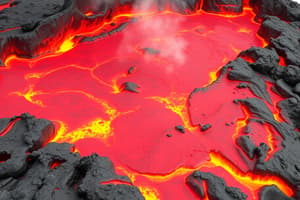Podcast
Questions and Answers
What is the relationship between the temperature of magma and its viscosity?
What is the relationship between the temperature of magma and its viscosity?
- As the temperature of magma decreases, the viscosity of magma increases.
- As the temperature of magma increases, the viscosity of magma decreases. (correct)
- As the temperature of magma increases, the viscosity of magma increases.
- There is no relationship between the temperature of magma and its viscosity.
Which factor does NOT affect the shape of the volcanic cone?
Which factor does NOT affect the shape of the volcanic cone?
- Composition of the magma
- Eruption history of the volcano (correct)
- Amount of gas in the magma
- Temperature of the magma
What type of volcanic cone is formed from alternate solidification of both lava and pyroclastic deposits?
What type of volcanic cone is formed from alternate solidification of both lava and pyroclastic deposits?
- Intrusive volcano
- Shield volcano (correct)
- Cinder cone
- Composite volcano
Which factor affects the viscosity of magma the most?
Which factor affects the viscosity of magma the most?
Which of the following is NOT a type of volcano based on its volcanic cone?
Which of the following is NOT a type of volcano based on its volcanic cone?
How does the amount of gas in the magma affect its viscosity?
How does the amount of gas in the magma affect its viscosity?
What property of a material refers to its resistance to flow?
What property of a material refers to its resistance to flow?
Which factor can affect the viscosity of magma?
Which factor can affect the viscosity of magma?
What determines the nature of a volcano's eruption?
What determines the nature of a volcano's eruption?
What feature is common to cinder cones?
What feature is common to cinder cones?
Which type of volcano is formed from alternate solidification of lava and pyroclastic deposits?
Which type of volcano is formed from alternate solidification of lava and pyroclastic deposits?
How does the composition of magma affect its viscosity?
How does the composition of magma affect its viscosity?
How does the temperature of magma affect its viscosity?
How does the temperature of magma affect its viscosity?
Which factor tends to increase the ability of magma to flow?
Which factor tends to increase the ability of magma to flow?
What type of lava is likely to form a thin sheet due to its ability to travel far before solidifying?
What type of lava is likely to form a thin sheet due to its ability to travel far before solidifying?
Which type of lava is likely to form a dome or columnar structure?
Which type of lava is likely to form a dome or columnar structure?
How does the composition of magma affect its viscosity?
How does the composition of magma affect its viscosity?
What is likely to happen if lava has a low amount of gas and high silica content as it rises?
What is likely to happen if lava has a low amount of gas and high silica content as it rises?
Flashcards are hidden until you start studying
Study Notes
Volcanoes and Magma
- A volcano is a natural opening in the Earth's structure where molten rocks, hot gases, smoke, and ash are ejected.
- Volcanoes are classified according to their record of eruption and shape (shield, cinder, and composite).
Factors Affecting Viscosity of Magma
- Viscosity is the property of a material's resistance to flow, described as its thickness and stickiness.
- Three primary factors affect the viscosity of magma: temperature, chemical composition, and amount of dissolved gases.
Temperature and Viscosity
- Higher temperature of magma decreases its viscosity.
- As lava flows, it cools, and its viscosity increases, making it harder to flow.
Composition and Viscosity
- Magmas with high silica content are more viscous than those with low silica content.
- Magmas with low silica content are relatively fluid and can travel far before solidifying.
Gas Content and Viscosity
- Dissolved gases in magma (mainly water vapor) increase its ability to flow.
- Loss of gases in near-surface environments makes magma more viscous, forming a dome or columnar shape.
Viscosity and Lava Flow
- Lava with low viscosity (low silica content) can travel a great distance, forming a thin sheet.
- Lava with high viscosity (high silica content) is too viscous to travel far and tends to break up as it flows.
- Lava with low gas content and high silica content is very viscous and does not flow out at all, forming a columnar plug in the vent.
- Lava with low gas content and high viscosity piles up in the vent, resulting in a dome.
Studying That Suits You
Use AI to generate personalized quizzes and flashcards to suit your learning preferences.




